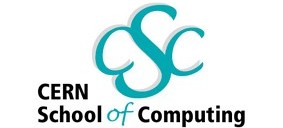|
Print Version
|
CSC2008 Examination Results
2008 Examination: Best marks
|
|
2008 Examination: facts and figures
|
2008 |
|
Students having
participated in the examination |
50
students (out of a total
of 52 ) registered in the final examination, that is 96% of the
students attending the school. |
|
Questions |
34
multiple choice questions were proposed.
|
|
Pass / No-Pass
threshold |
To be declared
as having successfully passed the examination, the student must have
replied correctly to
50% or
more
than 50%
of the
questions. |
|
Number of
correct answers for successful pass |
Any student having replied correctly to
17
or more than 17
questions has been declared as having successfully passed the CSC2008 examination |
|
Number of successful students |
47
students succeeded in the examination. |
|
Rewards |
-
CSC Diploma and GUC Certificates of
Credit will be handed over to the students at the occasion of the closing
ceremony Friday 5th of September.
-
The students with the
highest marks will be announced
at the closing session Friday 5th of September.
|
|
Marks |
Individual marks will be available on demand,
after the closing
session only, from Ivica Puljak (Ivica.Puljak
AT cern.ch).
|
|
|
|
|
2008 Examination: List of successful students
|
The CSC2008 Jury is pleased to warmly congratulate the following
students who have successfully passed the 2008 examination.
|
|
All the students
below have successfully passed the
examination.
We congratulate them! |
| Aberle, Christoph |
| Adams, James |
| Almeida, Nuno |
| Aydar, Metin |
| Basset, Romain |
| Belotelov, Ivan |
| Bernabeu Altay?, Gerard |
| Bria, Arnau |
| Ceuterickx, Sebastien |
| Crupi, Roberto |
| Cuciuc, Constantin Mihai |
| Dragicevic, Marko |
| Dziedziniewicz, Katarzyna |
| Germanas, Darius |
| Giordano, Raffaele |
| Gomes, Hugo |
| Gomez Saavedra, David |
| Gonzalez Maline, David |
| Gutzwiller, Olivier |
| Hassan, Ahmad |
| Hugosson, Hugo |
| Hynek, Vlastislav |
| Inglese, Vitaliano |
| Kaplun, Samuele |
| Kortelainen, Matti |
| Kwee, Regina |
| Li Gioi, Luigi |
| Lloret Iglesias, Lara |
| Mazurov, Alexander |
| Mollon, Remi |
| Mueller, Stefan E. |
| Nadal, Jordi |
| Oberst, Oliver |
| Ordonez Sanz, Gustavo |
| Pesaro, Giulia |
| Pierro, Antonio |
| Rodrigues, Daniel |
| Ruckert, Benjamin |
| Ryu, Seangchan |
| Sambade Varela, Alba |
| Schwemmer, Rainer |
| Siodmok, Andrzej |
| Tedesco, Paolo |
| Thorne, James |
| Valentan, Manfred |
| Wang, Lu |
| Zimmermann, Robert |
|
|
2008 Podium: Pictures and Bio
1st Mark
2008 |
|
Robert ZIMMERMANN |
Universit?t Bonn - Germany |
|
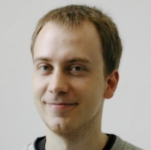 |
As a PhD student at
the University of Bonn I am currently working on setting up and
commissioning an ATLAS Tier-3 computing cluster in the context of the LHC
Computing Grid (LCG). This includes work on all required parts of such a
cluster, like network infrastructure (DHCP, dDNS), base-system (SL) and
middleware (gLite) installation and configuration, monitoring and the
automation of all of this (Quattor). I am also one of the administrators of
the local desktop (Debian) and batch (SGE) clusters for our high energy
physics groups. I am familiar with various flavors of Linux like Scientific
Linux, Fedora, Debian or Ubuntu, have, of course, run across MS Windows and
personally enjoy using Mac OSX. Programming and scripting languages I've
worked with (out of necessity or just for fun) include C, C++, Objective C,
ruby, perl and bash.
|
|
2nd Mark
2008 |
|
Constantin Mihai CUCIUC |
National Institute of Physics and Nuclear Engineering, Bucharest -
Romania |
|
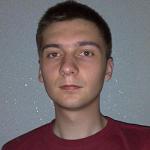 |
I am in the 5th year
of study at Informatics Physics, and I am currently involved in some
detector calibration and readout system development and configuration. Also,
I had to implement minor changes in some Athena analysis code and tweak the
firmware for some home-brew hardware. In doing so, I came across C/C++, ROOT
and LabVIEW, to which a few others learned in school or by myself can be
added.
|
|
Matti KORTELAINEN |
Helsinki Institute of Physics - Finland |
|
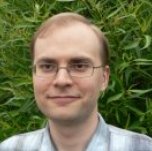 |
I am a first year
PhD student in experimental particle physics. My work at Helsinki Institute
of Physics includes Higgs analysis in the CMS experiment and code
development for test beam detector studies (Helsinki Silicon Beam Telescope,
SiBT). I have wide experience and knowledge from computing and programming.
I use actively Linux and Mac OS X, and I've also used commercial Unices,
NetBSD and Windows. My programming skills include C, C++, Java, Matlab,
Perl, Python and shell scripts. I am also familiar with assembly, Scheme and
SQL. I have worked in cluster and supercomputer environments, and I have
also used grids (mainly Nordugrid ARC).
|
|
Oliver OBERST |
Karlsruhe Institute of Technology - Germany |
|
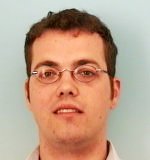 |
I started to work as
a PhD student at Karlsruhe in August 2007. The thesis will consist of two
parts, a computational one and a physics analysis. At the moment a computing
cluster at the Karlsruhe Institute of Technology is shared among eight
different departments and will also be part of the WLCG as the UNI-KARSLRUHE
Tier 3 site. To run Grid jobs on such a shared cluster the incompatibilities
between the requirements in hard and software of the different user groups
are resolved in using virtualization techniques to partition the computing
cluster dynamically. My current task is to implement this functionality into
the batch system, that it can manage the virtual machines (virtual worker
nodes) to connect the cluster and its mass storage system to the WLCG.
|
|
3rd Mark
2008 |
|
David GONZALEZ MALINE |
CERN, Geneva - Switzerland |
|
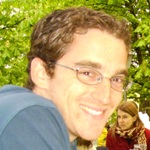 |
I studied software
engineer in Spain and the UK, finishing last year a MSc in artificial
intelligence. Nowadays I work at CERN in the SFT group, helping in the
development of the ROOT framework. In particular, my work is focused in the
development of mathematical algorithms, paying special attention to the
efficiency and accuracy of the different implementations. I also work with
methods of multivariate analysis and help in the development of some parts
of TMVA.
|
|
Paolo TEDESCO |
CERN, Geneva - Switzerland |
|
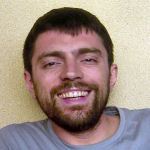 |
I am currently
working at CERN, at the development of File Transfer Service, a data
management grid middleware component. FTS is used by experiment frameworks
to move data across sites, offering load balancing and monitoring
capabilities. I have programming experience on Windows and Linux
environments, mainly in C++ and c#.
|
|
|
|
2008 Special distinction
|
The jury of
the CSC examination is pleased to give a special distinction
to the student below who obtained a mark of 28, just below
the 3rd mark (29) but who managed to finish the examination
in the shortest time (30min, 15sec).
|
4th Mark |
|
Katarzyna DZIEDZINIEWICZ |
CERN, Geneva - Switzerland |
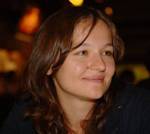
|
I am working in the
SFT group which belongs to CERN's PH department. I am involved in the
research in the field of multi-core processors. It focuses on benchmarking
of code performance achieved using different architectures and different
programming styles. It is closely linked to the work of the CERN's Open Lab
team. After the assessment. I will work on applying best techniques to the
code created for the CSM experiment.
Second part of my work focuses on further development of a web
service for a Conditions Database of the CMS experiment. The service is
written in Python and ingrates CMSSW software and the web framework used in
CMS.
|
|
|
|
CSC2008 Examination Results
2008 Examination: Best marks
|
|
2008 Examination: facts and figures
|
2008 |
|
Students having
participated in the examination |
50
students (out of a total
of 52 ) registered in the final examination, that is 96% of the
students attending the school. |
|
Questions |
34
multiple choice questions were proposed.
|
|
Pass / No-Pass
threshold |
To be declared
as having successfully passed the examination, the student must have
replied correctly to
50% or
more
than 50%
of the
questions. |
|
Number of
correct answers for successful pass |
Any student having replied correctly to
17
or more than 17
questions has been declared as having successfully passed the CSC2008 examination |
|
Number of successful students |
47
students succeeded in the examination. |
|
Rewards |
-
CSC Diploma and GUC Certificates of
Credit will be handed over to the students at the occasion of the closing
ceremony Friday 5th of September.
-
The students with the
highest marks will be announced
at the closing session Friday 5th of September.
|
|
Marks |
Individual marks will be available on demand,
after the closing
session only, from Ivica Puljak (Ivica.Puljak
AT cern.ch).
|
|
|
|
|
2008 Examination: List of successful students
|
The CSC2008 Jury is pleased to warmly congratulate the following
students who have successfully passed the 2008 examination.
|
|
All the students
below have successfully passed the
examination.
We congratulate them! |
| Aberle, Christoph |
| Adams, James |
| Almeida, Nuno |
| Aydar, Metin |
| Basset, Romain |
| Belotelov, Ivan |
| Bernabeu Altay?, Gerard |
| Bria, Arnau |
| Ceuterickx, Sebastien |
| Crupi, Roberto |
| Cuciuc, Constantin Mihai |
| Dragicevic, Marko |
| Dziedziniewicz, Katarzyna |
| Germanas, Darius |
| Giordano, Raffaele |
| Gomes, Hugo |
| Gomez Saavedra, David |
| Gonzalez Maline, David |
| Gutzwiller, Olivier |
| Hassan, Ahmad |
| Hugosson, Hugo |
| Hynek, Vlastislav |
| Inglese, Vitaliano |
| Kaplun, Samuele |
| Kortelainen, Matti |
| Kwee, Regina |
| Li Gioi, Luigi |
| Lloret Iglesias, Lara |
| Mazurov, Alexander |
| Mollon, Remi |
| Mueller, Stefan E. |
| Nadal, Jordi |
| Oberst, Oliver |
| Ordonez Sanz, Gustavo |
| Pesaro, Giulia |
| Pierro, Antonio |
| Rodrigues, Daniel |
| Ruckert, Benjamin |
| Ryu, Seangchan |
| Sambade Varela, Alba |
| Schwemmer, Rainer |
| Siodmok, Andrzej |
| Tedesco, Paolo |
| Thorne, James |
| Valentan, Manfred |
| Wang, Lu |
| Zimmermann, Robert |
|
|
2008 Podium: Pictures and Bio
1st Mark
2008 |
|
Robert ZIMMERMANN |
Universit?t Bonn - Germany |
|
 |
As a PhD student at
the University of Bonn I am currently working on setting up and
commissioning an ATLAS Tier-3 computing cluster in the context of the LHC
Computing Grid (LCG). This includes work on all required parts of such a
cluster, like network infrastructure (DHCP, dDNS), base-system (SL) and
middleware (gLite) installation and configuration, monitoring and the
automation of all of this (Quattor). I am also one of the administrators of
the local desktop (Debian) and batch (SGE) clusters for our high energy
physics groups. I am familiar with various flavors of Linux like Scientific
Linux, Fedora, Debian or Ubuntu, have, of course, run across MS Windows and
personally enjoy using Mac OSX. Programming and scripting languages I've
worked with (out of necessity or just for fun) include C, C++, Objective C,
ruby, perl and bash.
|
|
2nd Mark
2008 |
|
Constantin Mihai CUCIUC |
National Institute of Physics and Nuclear Engineering, Bucharest -
Romania |
|
 |
I am in the 5th year
of study at Informatics Physics, and I am currently involved in some
detector calibration and readout system development and configuration. Also,
I had to implement minor changes in some Athena analysis code and tweak the
firmware for some home-brew hardware. In doing so, I came across C/C++, ROOT
and LabVIEW, to which a few others learned in school or by myself can be
added.
|
|
Matti KORTELAINEN |
Helsinki Institute of Physics - Finland |
|
 |
I am a first year
PhD student in experimental particle physics. My work at Helsinki Institute
of Physics includes Higgs analysis in the CMS experiment and code
development for test beam detector studies (Helsinki Silicon Beam Telescope,
SiBT). I have wide experience and knowledge from computing and programming.
I use actively Linux and Mac OS X, and I've also used commercial Unices,
NetBSD and Windows. My programming skills include C, C++, Java, Matlab,
Perl, Python and shell scripts. I am also familiar with assembly, Scheme and
SQL. I have worked in cluster and supercomputer environments, and I have
also used grids (mainly Nordugrid ARC).
|
|
Oliver OBERST |
Karlsruhe Institute of Technology - Germany |
|
 |
I started to work as
a PhD student at Karlsruhe in August 2007. The thesis will consist of two
parts, a computational one and a physics analysis. At the moment a computing
cluster at the Karlsruhe Institute of Technology is shared among eight
different departments and will also be part of the WLCG as the UNI-KARSLRUHE
Tier 3 site. To run Grid jobs on such a shared cluster the incompatibilities
between the requirements in hard and software of the different user groups
are resolved in using virtualization techniques to partition the computing
cluster dynamically. My current task is to implement this functionality into
the batch system, that it can manage the virtual machines (virtual worker
nodes) to connect the cluster and its mass storage system to the WLCG.
|
|
3rd Mark
2008 |
|
David GONZALEZ MALINE |
CERN, Geneva - Switzerland |
|
 |
I studied software
engineer in Spain and the UK, finishing last year a MSc in artificial
intelligence. Nowadays I work at CERN in the SFT group, helping in the
development of the ROOT framework. In particular, my work is focused in the
development of mathematical algorithms, paying special attention to the
efficiency and accuracy of the different implementations. I also work with
methods of multivariate analysis and help in the development of some parts
of TMVA.
|
|
Paolo TEDESCO |
CERN, Geneva - Switzerland |
|
 |
I am currently
working at CERN, at the development of File Transfer Service, a data
management grid middleware component. FTS is used by experiment frameworks
to move data across sites, offering load balancing and monitoring
capabilities. I have programming experience on Windows and Linux
environments, mainly in C++ and c#.
|
|
|
|
2008 Special distinction
|
The jury of
the CSC examination is pleased to give a special distinction
to the student below who obtained a mark of 28, just below
the 3rd mark (29) but who managed to finish the examination
in the shortest time (30min, 15sec).
|
4th Mark |
|
Katarzyna DZIEDZINIEWICZ |
CERN, Geneva - Switzerland |

|
I am working in the
SFT group which belongs to CERN's PH department. I am involved in the
research in the field of multi-core processors. It focuses on benchmarking
of code performance achieved using different architectures and different
programming styles. It is closely linked to the work of the CERN's Open Lab
team. After the assessment. I will work on applying best techniques to the
code created for the CSM experiment.
Second part of my work focuses on further development of a web
service for a Conditions Database of the CMS experiment. The service is
written in Python and ingrates CMSSW software and the web framework used in
CMS.
|
|
|
|
|
